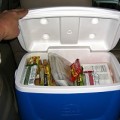![]()
 In these days you can never be too careful. The incidence of weather disasters is quickly on the rise, as well as the possibility of attack from foreign countries, nuclear disaster and political upheaval. If you are worried about the chance that your family could be caught off guard, rest assured. Below are some survival tips for families that will help get prepared for any disaster that may occur in the future.
In these days you can never be too careful. The incidence of weather disasters is quickly on the rise, as well as the possibility of attack from foreign countries, nuclear disaster and political upheaval. If you are worried about the chance that your family could be caught off guard, rest assured. Below are some survival tips for families that will help get prepared for any disaster that may occur in the future.
The very first step is to create a plan that everyone knows and is ready to stick to in case something unexpected does occur. Ideally, your family should have a set location to meet in case an emergency arises. Some people choose this to be their home. The reason to have this planned ahead of time is that during a moment of great crisis cell phone towers could be overloaded, leaving you unable to communicate with those you love. If you have young children you should also decide ahead of time who is responsible to pick which kids up on the way home. Having this planned out could save you crucial time and reduce confusion.
The second thing that you can plan ahead is to have materials ready which you can grab in a moments notice if you are forced to leave your home. Some people refer to this as a bug out bag. This bag can be kept in your vehicles so that no matter where you are you can leave in a moments notice. Typically, you would want anything that you would need for basic survival to be stored in this bag. Such items would include non-perishable food, cold weather gear, flashlight, basic tools, a road map, any life saving medications and anything else that you can think of that you will absolutely need. You want this to be as minimal as possible, yet not lacking in any necessities.
Just like you want to plan where to meet, you also want to have a plan of where you would go if you were forced to leave the region in which you live. When thinking about this you should consider the possibilities of what may occur. For example, if you live near a nuclear power plant, and that were attacked or if it malfunctioned, you would want to get at least 200 miles away from it to be sure to not become victim of fall-out. With that said, you will also want to be sure not to use interstates as a means of escape. These will likely become gridlocked, as they are not meant to deal with the type of traffic that comes with an emergency evacuation. To overcome this obstacle it is best to create a route using a map that uses roads that are less known and traveled. Having this planned ahead of time can give you the upper hand in getting your family out of the area quickly and safely.
There is also a possibility that an emergency could leave you stranded in your home. This, actually, can be the best situation, as you can be the most prepared for this scenario. To prepare for this you should stock a pantry with enough non-perishable food to last you at least a month. To prevent waste you can eat from this stock and replace it to ensure that the food is not spoiled when an emergency occurs. You should also stock up on batteries, toiletries and water. In a serious emergency you will be left to your own devices and even if you can leave there is the chance that the stores will be depleted and inflation could set in as well. You should also have materials on hand to board up doors and windows, as well as plastic to seal them. This will protect you from intruders and potential biological hazards. Again, planning ahead is the best way to protect your family, so take time to think about what you may need.
Now that you read the information above you have a basic idea about what it will take to survive any type of emergency that could strike and put your family at risk. In order to have peace of mind use the above advice while you plan for any possibility.




 OneCareNow is a general weblog that was created by several writers with a specific goal in mind: To offer one place that covers important topics which people really care about.
OneCareNow is a general weblog that was created by several writers with a specific goal in mind: To offer one place that covers important topics which people really care about.



![Back Pain Breakthrough by Palmer & Dr. Young [2024 Review]](https://www.onecarenow.org/wp-content/uploads/2021/02/Back-Pain-Breakthrough-Young-Amy-50x50.png)
![Vincent’s Midas Manifestation System Review [Updated 2024]](https://www.onecarenow.org/wp-content/uploads/2021/02/Midas-Manifestation-50x50.png)
![The NEW Happiness Code by David [Updated 2024 Review]](https://www.onecarenow.org/wp-content/uploads/2021/01/The-NEW-Happiness-Code-50x50.png)
![Michael Christianson’s Manifestation Sigil Review [2024]](https://www.onecarenow.org/wp-content/uploads/2021/01/Manifestation-Sigil-50x50.png)
